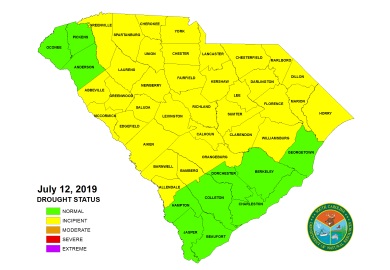July 12, 2019

Drought status remains the same for much of South Carolina
The S.C. Drought Response Committee met Friday, July 12, via conference call to update the drought statuses for South Carolina counties.
The drought declaration was removed completely for several counties in the Lowcountry, including Georgetown, Berkeley, Charleston, Dorchester, Colleton, Beaufort, Jasper and Hampton counties. Over the past 30 days, 6 to 14 inches of rainfall has fallen across much of coastal South Carolina.
“Most of the coastal counties within the Southern DMA have returned to typical seasonal precipitation patterns with a chance of afternoon and evening showers almost daily due to atmospheric instability from the sea breeze,” said Charleston County Commission of Public Works Jason Thompson. “Crop Moisture Index and Palmer Drought Severity Index corroborate the precipitation data for the coastal counties thus supporting moving all but the most inland county, Orangeburg County, out of incipient drought status.”
Additionally, Oconee, Pickens and Anderson counties remain normal.
The incipient drought status is maintained in the remaining 35 counties. The drought's impact on agriculture was a key indicator in the committee's decision to keep the incipient drought declaration in place for those areas. Without timely rain, pasture and crops will quickly show stress due to high temperature. Reports show spotty rainfall across most counties, according to Aaron Wood, S.C. Department of Agriculture Assistant Commissioner.
“Persistent below normal streamflow conditions in the middle portions of the Savannah Basin supported the decision to maintain an Incipient drought status for the counties of Abbeville, Greenwood, Edgefield, Aiken, Barnwell and Allendale,” said SCDNR Senior Hydrologist Scott Harder. “Below normal streamflow conditions for much of the Pee Dee Drought Management Area also supported maintaining an Incipient status for this region. An upgrade to a No Drought status in most of the Southern Drought Management Area was supported by improved streamflow levels on the Salkehatchie and Coosawhatchie Rivers.”
The committee will continue to monitor the weather and will meet again in August. More information about drought conditions and drought policy in South Carolina is available at www.scdrought.com.



